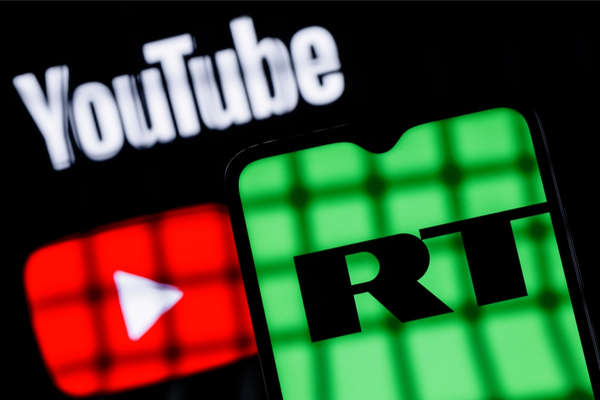Virtually all major western countries have imposed devastating sanctions on Vladimir Putin‘s regime amid the Russian invasion of Ukraine. As the battle for Kyiv and other Ukrainian cities continues, governments around the world — especially those in Europe — are calling on technological giants to restrict the flow of disinformation from the Kremlin. In response to these developments, tech giants have begun cracking down on Russian propaganda.
According to a new report from CNN, Facebook — or rather, its parent company, Meta — announced this week that it is blocking access to Russian news outlets Russia Today and Sputnik across the European Union. Nick Clegg, Meta’s Vice President of Global Affairs, said the ban was issued after receiving “requests from a number of Governments and the EU to take further steps in relation to Russian state-controlled media.” Meta’s Head of Security Policy Nathaniel Gleicher, meanwhile, said that the company had already blocked Russian state media content in Ukraine.
Twitter has not issued a full ban on Russian state media content yet, but it said that any tweet with a link to a Russia-affiliated news organization will be labeled with a warning that the post “links to a Russia state-affiliated media website.” Additionally, Twitter plans to “reduce the visibility and amplification of this content site-wide, no matter who it comes from.” Both Ukrainian and foreign reporters and journalists have relied on Twitter to share and receive information about the Russian invasion.
YouTube has not gone as far as Twitter and Facebook, but it has nonetheless imposed certain restrictions. After blocking Russian state media within Ukraine over the weekend, the platform said it would be “significantly limiting recommendations” to Kremlin-affiliated channels. European Commission leaders held a meeting with the CEOs of Google and YouTube on Sunday, asking for more restrictions, so a harsher crackdown on Russia-affiliated content is expected.
The Verge reports that Apple has paused sales of its physical products in Russia following the invasion of Ukraine, according to a statement from the company. This is Apple’s latest step after it imposed limitations for Apple Pay in Russia in accordance with sanctions, and it pulled some Russian news apps from the App Store outside of the country. In its statement, Apple says that it “stopped all exports into our sales channel in the country” last week in response to the violence. The company says that it will “continue to evaluate the situation” and that it’s communicating with the governments of affected countries.
Last week, Ukrainian Vice Prime Minister Mykhailo Fedorov published an open letter to Apple, asking the company to cut Russia off from its products, services, and App Store. In the letter, he says that he is “sure that such actions will motivate youth and active population of Russia to proactively stop the disgraceful military aggression.” While Apple’s statement doesn’t mention any planned actions regarding the App Store, the company does say that it’s turned off traffic and live incident reports in Apple Maps in Ukraine as a safety measure. Google has also turned off Ukraine traffic data in Google Maps — before it was suspended, researchers were using it to track the Russian invasion and were able to get some insight into troop movements.
Domain registrar and hosting provider Namecheap is terminating service provision for customers based in Russia in the face of what it describes as “war crimes” committed in Ukraine. An email sent Monday from Namecheap to customers, and shared online by various customers of the company, reads: “Unfortunately, due to the Russian regime’s war crimes and human rights violations in Ukraine, we will no longer be providing services to users registered in Russia. While we sympathize that this war may not affect your own views or opinion on the matter, the fact is, your authoritarian government is committing human rights abuses and engaging in war crimes so this is a policy decision we have made and will stand by.”
In an interview with The Verge, a Namecheap spokesperson said that an updated policy had been communicated to Russian customers under which exceptions would be made for “all anti-regime media, protest resources, and any type of websites that are helping to end this war and regime.” Exceptions would also be made for Russians who were “no longer a resident of Russia and do not support the regime in any way,” the policy said, though it is unclear how support for the regime would be assessed. The original email gave customers until March 6th to transfer domains to another provider, and states that Namecheap will assist them in the process; Namecheap has since revised this deadline to March 22nd.
Increasingly, web infrastructure organizations that have historically championed political neutrality are being forced to take sides. On February 28th, a Ukrainian official asked the Internet Corporation for Assigned Names and Numbers (ICANN) — a nonprofit organization that manages the allocation of top-level domains like .com — to revoke the .ru, .рф and .su domains, a move that would disconnect much of Russia from the global internet.
In response, Russia began restricting access to platforms such as Facebook, YouTube, and Twitter, as reported by Reuters on Friday. Users based in Russia told the outlet that images and videos were not loading properly on Facebook and that the messenger was not working at all for a while. At the same time, many encountered bugs when accessing Twitter, reporting that the site is slower than usual. This fight between the Kremlin and western giants is expected to intensify as Vladimir Putin’s regime seeks to promote its own narrative about what’s going on in Ukraine.
—
Photo Credit: Sergei Elagin / Shutterstock.com
